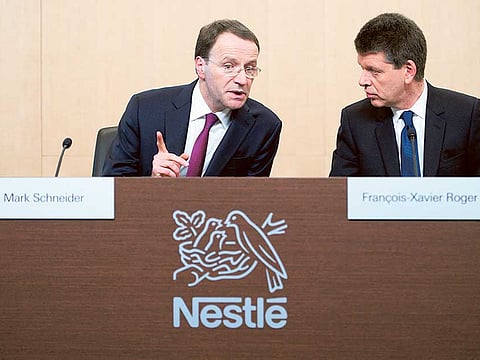Nestle braces for slowdown as new CEO plans restructuring
Revenue will increase 2 per cent to 4 per cent on an organic basis this year, accelerating to mid-single digits by 2020

ZURICH
Nestle SA’s new Chief Executive Officer Mark Schneider said it will take years to return to the growth rates targeted by his predecessors, forcing the world’s largest food company to step up restructuring and review its portfolio.
Revenue will increase 2 per cent to 4 per cent on an organic basis this year, accelerating to mid-single digits by 2020, Schneider told reporters at Nestle’s headquarters in Vevey, Switzerland Thursday. He expects restructuring costs to rise to about 500 million francs (Dh1.83 billion; $498 million) in 2017, putting pressure on profitability. The stock fell as much as 2.1 per cent in early trading in Zurich.
It’s taken less than two months in the job for Schneider to modify the annual growth forecasts Nestle has held onto for more than a decade. Revenue growth was 3.2 per cent in 2016, missing analysts’ estimates for 3.4 per cent and the slowest in at least a decade, illustrating the long list of challenges facing the new CEO. Those include deflation in Europe, slowing infant formula sales in China, inflation in Brazil and Russia, and increasing competition in the US chocolate market.
“It is a kind of a back-to-reality,” Pierre Tegner, an analyst at Natixis, said in a note. “The outlook shows that there is a lot to do.”
The new CEO said there are “tremendous” acquisition opportunities in the health, food and beverage industries, speaking in an interview on Bloomberg Television. Nestle will first attempt to fix underperforming businesses, and sell those that are non-strategic if it’s not possible to return them to growth, he said. Nestle’s stake in L’Oreal SA is a “highly strategic” asset, according to the new CEO.
“A turnaround and a durable earnings inflection will take longer than most expect,” said Robert Waldschmidt, an analyst at Liberum in London. “While there is no denying Nestle’s strong brand and category positions, we expect Schneider will first attack the weakness in the core portfolio. Disposals will likely precede larger acquisitions.”
Nestle said it expects significant cost savings by 2020, without quantifying. Restructuring will focus on costs that are “non-consumer-facing,” such as administration and optimising factory networks, the CEO said.
The KitKat maker said pricing improved in the second half of 2016 and is expected to continue to improve in 2017. The company said it expects a stable trading operating margin this year, excluding currency shifts.
Nestle also reported full-year trading operating profit rose 3.2 per cent to 13.7 billion francs ($13.7 billion), trailing the 13.9 billion francs analysts estimated. Total sales rose to 89.5 billion francs.
In 2005, Nestle began guiding for 5 per cent to 6 per cent average annual sales growth and improvement in the margin, excluding currency shifts.
— Bloomberg



